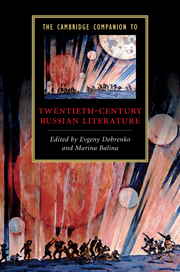Book contents
- Frontmatter
- 1 Poetry of the Silver Age
- 2 Prose between Symbolism and Realism
- 3 Poetry of the Revolution
- 4 Prose of the Revolution
- 5 Utopia and the Novel after the Revolution
- 6 Socialist Realism
- 7 Poetry after 1930
- 8 Russian Epic Novels of the Soviet Period
- 9 Prose after Stalin
- 10 Post-Soviet Literature between Realism and Postmodernism
- 11 Exile and Russian Literature
- 12 Drama and Theatre
- 13 Literature and Film
- 14 Literary Policies and Institutions
- 15 Russian Critical Theory
- Index
11 - Exile and Russian Literature
Published online by Cambridge University Press: 28 May 2011
- Frontmatter
- 1 Poetry of the Silver Age
- 2 Prose between Symbolism and Realism
- 3 Poetry of the Revolution
- 4 Prose of the Revolution
- 5 Utopia and the Novel after the Revolution
- 6 Socialist Realism
- 7 Poetry after 1930
- 8 Russian Epic Novels of the Soviet Period
- 9 Prose after Stalin
- 10 Post-Soviet Literature between Realism and Postmodernism
- 11 Exile and Russian Literature
- 12 Drama and Theatre
- 13 Literature and Film
- 14 Literary Policies and Institutions
- 15 Russian Critical Theory
- Index
Summary
The Russians seem to think they have a monopoly on exile.
(Anton Shammas)Banishing writers in order to silence them is as old as the writing profession itself, and European literature is replete with examples of writers who were exiled from their native country or city for their words or deeds. The art of writers as diverse as Ovid, Dante, Rousseau, Mann, Joyce and Kundera has been shaped by their experience of exile. Since the onset of its modern period (i.e. from 1800 onwards) Russia has contributed more than its fair share of writers in exile to world literature. The long list of Russian writers who experienced exile at some point in their lives overlaps to some extent with a list of Russian canonical authors, including Pushkin, Lermontov, Turgenev, Dostoevsky, Bunin, Khodasevich, Tsvetaeva, Pasternak, Nabokov, Mandelshtam, Solzhenitsyn, and Brodsky. The large number of exiled writers is testimony to the traditionally difficult and dangerous relationship between the writer and the Russian state and the designation of exile as an ‘occupational hazard’ for writers rings particularly true in the Russian context.
Exile as a theoretical concept, a psychological condition, or a concrete experience is marked by duality. At the core of this duality lies the divided identity of exiles, once they have been banished from a place of belonging to a place that is perceived as other and foreign. Critics like Edward Said and Michael Seidel have duly noted and analysed the exile’s ‘contrapuntal’ perception. Much has been made of this twofold exilic perception as being conducive to the literary imagination in aiding the writer’s simultaneous perception of the real and the imaginary. This romantic concept of exile is, however, challenged by the potential brutality of the experience itself.
- Type
- Chapter
- Information
- The Cambridge Companion to Twentieth-Century Russian Literature , pp. 195 - 214Publisher: Cambridge University PressPrint publication year: 2011
- 3
- Cited by



